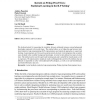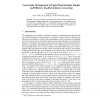236 search results - page 9 / 48 » Learning Teleoreactive Logic Programs from Problem Solving |
112
click to vote
JMLR
2006
15 years 2 months ago
2006
We develop kernels for measuring the similarity between relational instances using background knowledge expressed in first-order logic. The method allows us to bridge the gap betw...
112
Voted
ICML
1994
IEEE
15 years 5 months ago
1994
IEEE
This paper describes a new methodfor inducing logic programs from examples which attempts to integrate the best aspects of existingILP methodsintoa singlecoherent framework. In pa...
109
Voted
KES
2005
Springer
15 years 7 months ago
2005
Springer
We present a simple, yet general top-down query answering procedure for logic programs managing uncertainty. The main features are: (i) the certainty values are taken from a certai...
156
click to vote
ILP
2004
Springer
15 years 7 months ago
2004
Springer
One challenge faced by many Inductive Logic Programming (ILP) systems is poor scalability to problems with large search spaces and many examples. Randomized search methods such as ...
156
Voted
WLP
2007
Springer
15 years 8 months ago
2007
Springer
Answer-set programming (ASP) is an emerging logic-programming paradigm that strictly separates the description of a problem from its solving methods. Despite its semantic elegance,...


